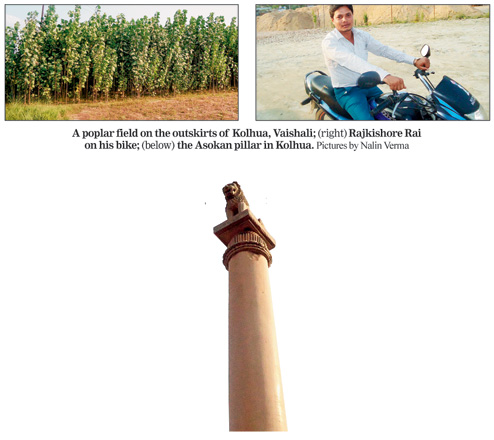
on Saturday. Picture by Ranjeet Kumar Dey
Patna, April 2: Denied their daily fix, country liquor addicts in the city feel like fish out of water.
"They are behaving like mad men for the past two days, roaming here and there in search of some intoxicant to fulfil their needs. They are saying they will die if they do not get their dose of country liquor," said Munna Lal Prasad, a bhuja (roasted grains) seller who plies his ware from a hand-pulled cart on Fraser Road.
Munna, who is in his 50s, was talking about those addicted to country liquor daily. These are the people who do hard labour, like rickshaw-pullers, goods cart pullers, daily wage labourers, masons, sweepers, goods unloaders, coolies and drivers among others.
While Indian made foreign liquor (IMFLF) consumers are hopeful "normal life" will resume after initial hiccups, th-ere is little hope for country liquor drinkers, as the government has imposed a blanket ban on manufacturing, trade and consumption of country liquor since April 1.
"My head has been reeling for the last two days and I know it is because I have not had liquor for two days," said Dina, a 46-year-old rickshaw-puller. "I couldn't even pedal my rickshaw in the morning. "
The rickshaw-puller, who hails from Vaishali district, said he used to begin work in the morning after having some sattu (roasted gram powder) for breakfast and then finishing off a 200ml plastic bottle of country liquor costing Rs 24. He had another bottle in the evening after work.
"I may not survive without alcohol. It seems I will have to switch to 'English' (foreign liquor) to work and live, but even their shops are not open," Dina said. All 5,500 private liquor shops in the state were shut on March 31. There were 70 country liquor shops in the city.
The government will now run 656 foreign liquor shops in urban areas of the state.
Driver Manoj Kumar said he used to drink both country liquor and IMFL, but will now have to curtail his habits. "The government should have brought in prohibition slowly, by rationing supply and increasing costs. People may fall ill now," Manoj said. "Chronic addicts might suffer from palpitation, nervousness, sleeplessness, increased frequency of urination, indigestion and constipation," said Dr Diwakar Tejaswi. Drugs for withdrawal syndrome include beta-blockers for heart palpitations, sleep-inducing medicines, as well as muscle and mind relaxants.
Prohibition pledge
Chief minister Nitish Kumar today said all government employees will take a vow not to drink liquor. "All police officials will take the prohibition pledge on April 4, and remaining government employees on April 5," Nitish said while speaking at a religious convention in Rajgir.
Talking to The Telegraph, chief secretary Anjani Kumar Singh said 1.7 crore persons including teachers, MLAs and MLCs have already taken the prohibition pledge.
The chief secretary held a video conferencing with senior excise and district administration officials in the evening over implementation of the new Bihar Excise (Amendment) Act 2016 and guided them about the measures in it. The officials were asked to stick to the new Act and ensure that the violators are punished.
Anjani said that the excise and police officials have asked to ensure that unscrupulous elements do not mix intoxicants in toddy (fermented palm sap) to sell it to consumers.










